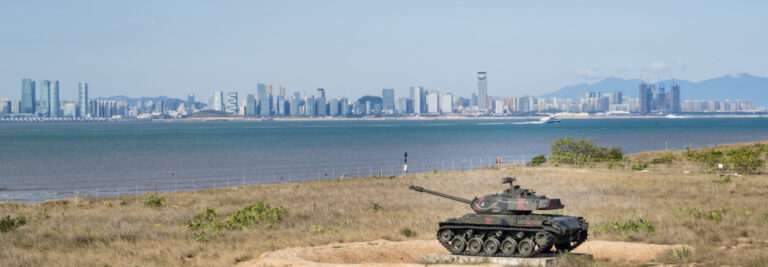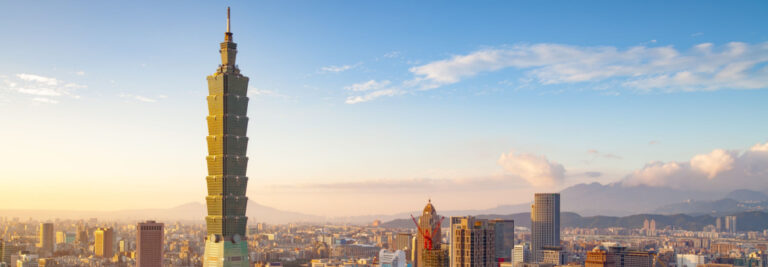In mid-May, a series of events occurred in quick succession that either closed or severely curtailed operations by the representative offices maintained by Taiwan in Hong Kong and Macao, and vice versa. The most proximate and immediate reason for the de facto closure of the Taipei Economic and Cultural Office in Hong Kong (TECO, 台北經濟文化辦事處 [香港辦事處]) was the denial of visa renewals for TECO staffers after they refused to sign a statement in support of the “One-China Principle” (一中原則), as insisted upon by officials of the People’s Republic of China (PRC). However, this controversy, which provided a pretext for Beijing and the Hong Kong city administration to force out most of Taiwan’s consular officials, has overshadowed other disputes between Taiwan and the PRC that could have played equally significant if not more substantive factors in the decision to effectively close these representative offices.
These actions are reflective of Beijing’s growing paranoia regarding the allegedly subversive role played by international non-governmental organizations (NGOs), as well as its suspicions that Taiwan “separatists” are acting in tandem with like-minded opposition elements in the Hong Kong Special Administrative Region (HKSAR). Statements made by PRC government agencies and state press outlets throughout the spring and summer have accused both international NGOs—many of which operate branches in Taiwan—as well as Taiwan government organizations of acting as primary “black hands” (黑手) responsible for stirring up unrest in the HKSAR.
The CCP’s Paranoia Regarding International NGOs in Hong Kong
The PRC’s ruling Chinese Communist Party (CCP) has long fostered a paranoid view of NGOs—particularly international NGOs—for their alleged roles in fomenting “color revolutions” (顏色革命) around the world. The CCP’s suspicions of NGOs have resulted in measures such as the “Law of the People’s Republic of China (PRC) on Administration over the Activities of Overseas Non-Government Organizations Within China PRC” (中華人民共和國境外非政府組織境內活動管理法) officially implemented in 2017, part of a larger effort under Xi Jinping (習近平) to crack down on civil society groups in the PRC. From the onset of major protests in the HKSAR in 2019, PRC state press outlets (see examples here and here) have accused both international and local NGOs—including Hong Kong Human Rights Monitor, as well as international labor organizations such as the US-based Solidarity Center—of acting as the unseen puppet masters behind the unrest.
The CCP’s conspiracy theories regarding international NGOs were encapsulated in a 2019 propaganda film produced by Xinhua, the PRC’s state news agency, titled “Some Foreign NGOs Play a Sinister Role in Hong Kong Unrest.” The five-minute film, produced in English and distributed via Twitter and YouTube, alleged that the activities of international NGOs—in particular, “the notorious National Endowment for Democracy [NED] in the United States”—were a primary factor underlying the opposition movement and protests in Hong Kong. The film asserted that “NGOs have been active in providing support for those creating social unrest in Hong Kong,” and that “about 100 local Hong Kong NGOs and over 100 overseas NGOs have been shown to be involved in fomenting the city’s current unrest.” Of these, the “NED is well known for its meddling in the internal affairs and political elections of numerous foreign countries […] NED supplies funds and training to selected groups to support the so-called ‘democratic’ movements.” Other allegedly subversive international NGOs identified in the film included the Open Society Foundation, funded by “American financial predator” George Soros; the International Bar Association; and UN Watch and the Human Rights Foundation, which “have provided platforms for Hong Kong separatists to spread their inflammatory rhetoric.”
This video also showed the PRC propaganda emphasis on elevating voices from the marginalized fringes of the pro-unification spectrum of Taiwan politics. The video included a clip of National Taiwan University Professor Chang Ya-chung (張亞中)—the director of the Sun Yat-Sen School (孫文學校), and longshot aspirant for the 2020 Kuomintang (KMT) presidential nomination and 2021 KMT chairmanship—speaking at a Hong Kong forum titled “NGOs and Color Revolutions” (NGO與顏色革命). Chang, echoing PRC narratives, asserted that “I think many NGOs are very good, and well-intentioned. […] However, some countries, for the sake of their national interests, make use of NGOs to pursue their vainly hoped-for political goals.”
In December 2019, a foreign ministry spokesperson announced that the PRC was imposing “sanctions on NGOs that played an egregious role in the recent disturbance[s] […] including [NED], the National Democratic Institute for International Affairs, the International Republican Institute, Human Rights Watch and Freedom House […] these NGOs have supported anti-China plotters […] aiding and abetting them in extreme violent criminal acts and inciting ‘Hong Kong independence’ separatist activities. They are much to blame for the chaos in Hong Kong.”
The Increasing Presence of International NGOs in Taiwan
In contrast with Beijing’s suspicions, Taiwan’s government has taken measures in recent years to encourage international NGOs to establish branches in Taiwan. Furthermore, the PRC’s increasingly harsh measures in 2020-2021 to either suppress or expel international NGOs and media organizations have led an increasing number of such organizations to relocate to Taiwan. This has included Chinese dissident organizations such as the New School for Democracy (華人民主書院), a pro-democracy organization founded in 2011 by Wang Dan (王丹), one of the prominent student leaders of the 1989 Tiananmen protest movement. In September 2020, citing “concern […] about the safety of our staff,” the organization closed its Hong Kong office and announced plans to consolidate in Taiwan.
In October 2020, both the National Democratic Institute (NDI) and the International Republican Institute (IRI) announced plans to open offices in Taiwan. These US-based NGOs—which nominally are loosely affiliated with America’s two major political parties, but act as largely independent institutions—perform work related to political party and civil society building throughout the world, particularly in emerging democracies. NDI’s announcement held up “Taiwan’s democracy [as] a model for the Asia-Pacific region and the world,” and stated that NDI’s new office would “strengthen and expand partnerships with Taiwan’s civic tech community, legislature, and government officials.” Similarly, IRI’s announcement praised Taiwan as “a place that embodies the commitment to democratic values,” and asserted that “as the CCP becomes more aggressive in violating the global rules-based order, now is the time for all democracies–including the United States–to invest in strengthening ties with Taiwan.”
PRC state press criticized the establishment of the NDI and IRI offices as “a further infiltration of US political forces in the island of Taiwan […] NDI and IRI are notorious for churning out anti-China propaganda and meddling in other countries’ internal affairs […] these NGOs will do nothing but disrupt cross-Straits exchanges, through funding local so-called ‘think tanks’ to create more rumors targeting the Chinese mainland while training young people to fight for the ‘independence’ of Taiwan.” On July 23, in response to a “business advisory” for Hong Kong and sanctions against HKSAR officials announced by US federal agencies, the PRC announced retaliatory sanctions against 7 persons or organizations—including DoYun Kim, program assistant for Asia at NDI, and Adam King, associate director for Asia at IRI.
Taiwan’s Creation of Organizations for Hong Kong Affairs—and Beijing’s Reaction
In June 2020, in response to the passage of the “Hong Kong National Security Law” (香港國家安全法) and Beijing’s growing crackdown on the territory, Taiwan’s Mainland Affairs Council (MAC, 大陸委員會) announced the formation of a “Hong Kong Humanitarian Aid Project” (香港人道援助行動方案), which in turn would operate a “Taiwan-Hong Kong Office for Exchanges and Services” (台港服務交流辦公室). The inter-agency “Project,” to be operated under the official Taiwan-Hong Kong Economic and Cultural Co-Operation Council (財團法人臺港經濟文化合作策進會), was intended to “provide friendly and streamlined services and basic care for Hong Kong citizens arriving in Taiwan in need of assistance, as well as for Hong Kong-based multinational companies and international corporations relocating to Taiwan.” MAC further asserted that “the Project fully demonstrates the determination and goodwill of the government to support the Hong Kong people in protecting their democracy, freedom, and human rights.”
The creation of these government coordination bodies appears to have dovetailed with, and magnified, the anxieties of Beijing and the HKSAR city administration regarding alleged subversion conducted by “hostile external forces.” Throughout the summer of 2021, PRC agencies and the CCP propaganda apparatus have conducted an expanding effort to identify Taiwan’s governing Democratic Progressive Party (DPP)—alongside the United States government—as the primary “black hands” fomenting “separatist” unrest in the HKSAR. Alongside the de facto downsizing of the TECO office in Hong Kong and the parallel closure of Hong Kong’s representative office in Taiwan, the HKSAR administration issued a press release on May 21 that stated:
In recent years, Taiwan has grossly interfered in Hong Kong’s affairs on repeated occasions […] Most notably, Taiwan has launched the so-called “Hong Kong Aid Project” and unilaterally established the so-called “Taiwan-Hong Kong Office for Exchanges and Services” [that] offer[ed] assistance to violent protesters and people who tried to shatter Hong Kong’s prosperity and stability.
Building on this, the PRC State Council Taiwan Affairs Office (TAO, 國務院臺灣事務辦公室) issued a statement on June 21 that asserted “[The role of] Taiwan’s organizations […] in incidents causing chaos in Hong Kong cannot be concealed. The DPP authorities have once again attacked and smeared ‘One Country Two Systems’ [and we] must expose the actions and political schemes of [their] organizations based in Hong Kong!” A subsequent TAO statement on June 24, titled “Sternly Admonishing DPP Authorities to Immediately Withdraw from Involvement as Black Hands in Hong Kong Affairs,” accused the DPP of acting in collusion with Apple Daily (蘋果日報) publisher Jimmy Lai (黎智英) to “cause chaos in Hong Kong [and] plot for ‘independence.'”
Conclusion
Although it is certainly not the only factor involved, Beijing’s suspicious attitude towards NGOs and “hostile foreign forces” likely played a significant role in the closure of the representative offices between Taiwan and Hong Kong (as well as Macao) in May 2021. The paranoid and blinkered—but almost certainly sincerely held—belief on the part of the senior CCP leadership that US and Taiwan-based organizations were involved in orchestrating the HKSAR opposition movement and the major protests of 2019-2020 provided a strong motivation for Beijing to shutter these offices. Both the closure of the representative offices, and the intensifying propaganda vilification of Taiwan-based NGOs and governmental organizations as “black hands” engaged in the funding and direction of “separatist” activities, are part and parcel of Beijing’s continuing efforts to suppress civil society in the HKSAR and further cut the territory off from linkages to Taiwan. These measures can only be expected to continue and intensify as the second half of 2021 unfolds.
The main point: The PRC government maintains a paranoid view of international NGOs, as well as their alleged roles in supporting the opposition movement and fomenting unrest in Hong Kong. Beijing’s suspicious attitude, and its assertions that Taiwan government organizations and the Democratic Progressive Party were involved in supporting these NGOs, likely played a contributing role in the May 2021 closure of Taiwan’s representative office in Hong Kong.




